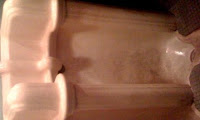
Travelogue 256, December 27
Spinning Wheel, Part Four
Winter wears a different face every day.
Yesterday temperatures rose to 37 and then dropped back below freezing at night, so now the sidewalks are a mess. I must get out for a morning walk, but it’s not a walk. It’s a shuffle, slide, slide, shuffle.
The sky is overcast, but aside from having to negotiate the frozen soup, it’s a pleasant day. The city has come back to life. We have returned from the abyss of miraculous birth, and we hold steady our course toward salvation.
I very slowly wend my way to Lake Street. I’ve been hanging out at the Midtown Global Market at the corner of Lake and Chicago. It’s the perfect distance for a winter walk, and the market is colorful. It inhabits the old Sears building, which has dominated this stretch of Lake Street since 1928, a brown brick monolith of Chicago art deco that was abandoned by the Sears company in 1994. A local group of community organizations was allowed to redevelop the site, and the Global Market opened in 2006.
Inside, you walk among the stalls. You’ve got your coffee and sweets shops. You’ve got your restaurants of every flavor. You’ve got your African and Latin and Asian goods. You’ve got Mexican groceries. It’s divertido for the whole family.
Renan has followed Jesus to the River Jordan, where he meets up with John the Baptist. Followers of each gather on coffee breaks, and exchange tips on pleasing God. John and Jesus are roughly the same age, but John has the edge in fire, following, and history. Jesus studies his friend; there’s much to learn. Jesus has created a buzz among the religious communities in northern Israel, and the Jordan becomes his Rubicon. Is it time to step into the hot spotlight, or shall he return to the peaceful Sea of Galilee where he can grow old as the friendly local rabbi and guru? It’s an unforgiving business, though. How long can one pooh-pooh the national circuit as a preacher before the locals begin to wonder about you? It isn’t long before Salome has her way with the young Baptiste, and Jesus is the obvious heir. From there, events accelerate.
Christ is born, and I’m already thinking about Easter. I’m wondering about those three heady, feverish years, the years of his ministry. We’re probably not supposed to speculate what Jesus might have felt, but I can’t help feeling some compassion.
I’m thinking about this movie, ‘Milk’. If comparing Jesus’s life with that of a gay activist doesn’t get me shot, I’m not sure what will, but really: if it helps me to understand or feel compassion, then what’s the sin? Sean Penn, of course, does a marvelous job portraying the big-hearted man whose eyes are open to suffering, and whose every action in the interest of others leads him toward his destruction. Eventually, his path leads him into the spotlight of public life. Once you’re in that arena, it seems like your life is less and less your own. Your story belongs to a dozen others, and then a hundred, and then a thousand. You are borne forward on the feet of a mob, and there is barely time for a sigh.
This is where I say, as Voltaire might have done were he sitting at this laptop, ‘If there were no heaven, it would be necessary to invent one.’ I would wish for a place of rest and reflection for people like this. Isn’t that what lies behind our yearnings for a heaven? Isn’t it just the chance for a breath and a glance back over what we’ve done? Life eternal, our just reward, etc., fine, but I’d say the heart of the matter is simply reflection.
I’d like to summon that tunnel of light, and I’d like to be there when Jesus checks in. Now, I know a lot of people would say the same thing with malicious intent: ‘I want Jesus to see what he hath wrought, all the wars in his name, etc.’ But that’s not my intention. Time takes hold of him; events tumble one after another with dizzying speed. He stands firm, staying true to his teachings, and staying true to his disciples. The end comes quickly. Tears and applause. He gives them an encore. The house empties; all is silent. The rest is up to the disciples. That’s a scary thought, but it’s how it has to be. Okay, we turn toward the light. The dust settles. The mind quiets down. It’s Jesus’s turn in the screening room. What does he say? Is he happy with how everything went down, seen now in the light of heaven? Are there regrets – the picnics he missed, the noli me tangere thing, some hasty sermons, hasty resurrections, whatever? Would he wish he had had more time to think things through?
Oh well, it’s a private moment. Let’s leave him to his reflections. As the Muslims say, peace be upon him. There are some tasty enchiladas here at the Global Market to distract us. Bon appetit!

















